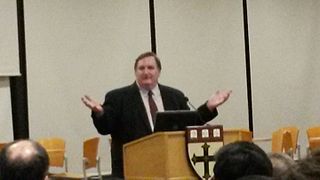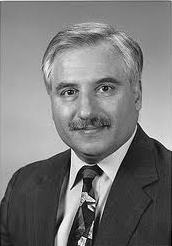
Daniel Irvin Rather Jr. is an American journalist, commentator, and former national evening news anchor. He began his career in Texas, becoming a national name after his reporting saved thousands of lives during Hurricane Carla in September 1961. Rather spontaneously created the first radar weather report by overlaying a transparent map over a radar image of Hurricane Carla. In his first national broadcast, he helped initiate the successful evacuation of 350,000 people. He reported on some of the most significant events of the modern age, such as the fall of the Berlin Wall, the Gulf War, 9/11, the Iraq War, and the war on terror.
Forensic psychology is the practice of psychology applied to the law. Forensic psychology is the application of scientific knowledge and methods to help answer legal questions arising in criminal, civil, contractual, or other judicial proceedings. Forensic psychology includes research on various psychology-law topics, such as jury selection, reducing systemic racism in criminal law, eyewitness testimony, evaluating competency to stand trial, or assessing military veterans for service-connected disability compensation. The American Psychological Association's Specialty Guidelines for Forensic Psychologists reference several psychology subdisciplines, such as social, clinical, experimental, counseling, and neuropsychology.
Passive-aggressive behavior is characterized by a pattern of passive hostility and an avoidance of direct communication. Inaction where some action is socially customary is a typical passive-aggressive strategy. Such behavior is sometimes protested by associates, evoking exasperation or confusion. People who are recipients of passive-aggressive behavior may experience anxiety due to the discordance between what they perceive and what the perpetrator is saying.

David Cyril Geary is an American cognitive developmental and evolutionary psychologist with interests in mathematical learning and sex differences. He is currently a Curators’ Professor and Thomas Jefferson Fellow in the Department of Psychological Sciences and Interdisciplinary Neuroscience Program at the University of Missouri in Columbia, Missouri.
Gaslighting is a colloquialism, loosely defined as manipulating someone into questioning their own perception of reality. The expression, which derives from the title of the 1944 film Gaslight, became popular in the mid-2010s. Merriam-Webster cites deception of one's memory, perception of reality, or mental stability. According to a 2022 Washington Post report, it had become a "trendy buzzword" frequently used to describe ordinary disagreements, rather than those situations that align with the word's historical definition.

Kelly David Brownell is a clinical psychologist and scholar of public health and public policy at Duke University whose work focuses on obesity and food policy. He is a former dean of Duke's Sanford School of Public Policy. Noted for his research dealing primarily with obesity prevention, as well as the intersection of behavior, environment, and health with public policy, Brownell advised former First Lady Michelle Obama's initiatives to address childhood obesity and has testified before Congress. He is credited with coining the term "yo-yo dieting", and was named as one of "The World's 100 Most Influential People" by Time Magazine in 2006.
Gerald C. Davison is an American psychologist and professor. He is currently Professor of Psychology and Gerontology and former dean of the Leonard Davis School of Gerontology at the University of Southern California.

David Levy is an American psychologist, professor, author, stage director, and actor. He is a professor of psychology at the Graduate School of Education and Psychology of Pepperdine University, near Malibu, California. He has co-authored a textbook on cross-cultural psychology and critical thinking, and has appeared on radio and television.

The Wright Institute is a private graduate school focused on psychology and located in Berkeley, California.
In psychology, manipulation is defined as subterfuge designed to influence or control another, usually in a underhanded manner which facilitates one's personal aims. Methods used to distort the individual's perception of reality may include seduction, suggestion, persuasion and blackmail to induce submission. Usage of the term varies depending on which behavior is specifically included, whether referring to the general population or used in clinical contexts. Manipulation is generally considered a dishonest form of social influence as it is used at the expense of others.
Minimisation or minimization is a type of deception involving denial coupled with rationalisation/rationalization in situations where complete denial is implausible. It is the opposite of exaggeration. Minimisation, or downplaying the significance of an event or emotion, is a common strategy in dealing with feelings of guilt. Words associated with minimisation include:
Marshall Colt is an American management consultant and combat-decorated, former captain in the United States Navy in San Diego, who was an actor in film and television from 1976 to 1995.
John C. Norcross is an American professor, clinical psychologist, and author in psychotherapy, behavior change, and self-help.
Abusive power and control is behavior used by an abusive person to gain and/or maintain control over another person. Abusers are commonly motivated by devaluation, personal gain, personal gratification, psychological projection, or the enjoyment of exercising power and control. The victims of this behavior are often subject to psychological, physical, sexual, or financial abuse.
Deborah H. Gruenfeld is an American social psychologist whose work examines the way people are transformed by the organizations and social structures in which they work. She is the author of numerous papers on the psychology of power and group behavior. She is the Joseph McDonald Professor of Organizational Behavior at the Stanford Graduate School of Business, and is also a co-director of the Executive Program for Women Leaders at the same institution, and is a board member of Stanford’s Center for the Advancement of Women’s Leadership. She was the inaugural chairholder of the Moghadam Family Professorship in 2008. She is a board member of the LeanIn Foundation.
Guilt tripping is a form of emotional blackmail that is often designed to manipulate other people by preying on their emotions and feelings of guilt or responsibility. This can be a form of toxic behavior that can have detrimental effects on a person's well-being as well as their relationships.
Susan H. McDaniel is an American psychologist and the Dr. Laurie Sands Distinguished Professor of Families & Health at the University of Rochester School of Medicine and Dentistry. She was the 2016 president of the American Psychological Association (APA).

David H. Barlow is an American psychologist and Professor Emeritus of Psychology and Psychiatry at Boston University. He is board certified by the American Board of Professional Psychology. Barlow is known for his research and publications on the etiology, nature, and treatment of anxiety disorders. The models and treatment methods that he developed for anxiety and related disorders are widely used in clinical training and practice. Barlow is one of the most frequently cited psychologists in the world.

Tracy Dennis-Tiwary is an American clinical psychologist, author, health technology entrepreneur, and professor of psychology and neuroscience at Hunter College and the Graduate Center of The City University of New York. Her research explores emotion regulation and its role in mental health and illness, with a particular focus on anxiety and anxiety-related attention biases, as well as child emotional development. She is known for her nuanced view of the impact of digital technology and social media on psychological well-being in youth and adults, including adjustment, relationship quality, anxiety, and emotion regulation.







